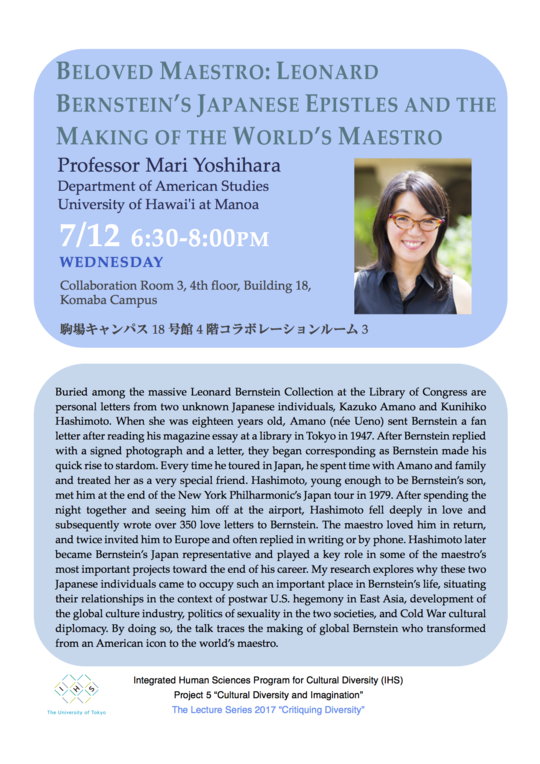
Project 5 “Critiquing Diversity” lecture series 2017 “Beloved Maestro: Bernstein’s Japanese Epistles and the Making of the World’s Maestro” by Professor Mari YOSHIHARA
- Time and Date
- 6:30 - 8:00PM, Wednesday, July 12, 2017
- Venue
- Collaboration Room 3, 4th Floor, Building 18, The University of Tokyo, Komaba
- Speaker
- Mari YOSHIHARA (Professor of American Studies, University of Hawai’i)
- Language
- English
- Note
- Admission
- Free; No Registration Required
- Organized by
- the Educational Project 5 “Cultural Diversity and Imagination,” Integrated Human Sciences Program for Cultural Diversity, The University of Tokyo
Project 5 “Cultural Diversity and Imagination” is pleased to inform that we are inviting Professor Mari Yoshihara to our lecture series 2017 “Critiquing Diversity”. She will talk about Maestro Leonard Bernstein’s relationships to Japan and the possibility of cultural diversity from the perspective of gender studies. We look forward to seeing you all at this event.
abstract
Buried among the massive Leonard Bernstein Collection at the Library of Congress are personal letters from two unknown Japanese individuals, Kazuko Amano and Kunihiko Hashimoto. When she was eighteen years old, Amano (née Ueno) sent Bernstein a fan letter after reading his magazine essay at a library in Tokyo in 1947. After Bernstein replied with a signed photograph and a letter, they began corresponding as Bernstein made his quick rise to stardom. Every time he toured in Japan, he spent time with Amano and family and treated her as a very special friend. Hashimoto, young enough to be Bernstein’s son, met him at the end of the New York Philharmonic’s Japan tour in 1979. After spending the night together and seeing him off at the airport, Hashimoto fell deeply in love and subsequently wrote over 350 love letters to Bernstein. The maestro loved him in return, and twice invited him to Europe and often replied in writing or by phone. Hashimoto later became Bernstein’s Japan representative and played a key role in some of the maestro’s most important projects toward the end of his career. My research explores why these two Japanese individuals came to occupy such an important place in Bernstein’s life, situating their relationships in the context of postwar U.S. hegemony in East Asia, development of the global culture industry, politics of sexuality in the two societies, and Cold War cultural diplomacy. By doing so, the talk traces the making of global Bernstein who transformed from an American icon to the world’s maestro.
About the speaker
Mari YOSHIHARA (Professor of American Studies, University of Hawai’i)
Major works:
- 『「アジア人」はいかにしてクラシック音楽家になったのか?──人種・ジェンダー・文化資本』(アルテスパブリッシング、2013年)
- 『ヴァン・クライバーン国際ピアノ・コンクール──市民が育む芸術イヴェント 』(アルテスパブリッシング、2010年) (矢口祐人と共編著)
- 『現代アメリカのキーワード』(中公新書、2006年)
- Embracing the East: White Women and American Orientalism (Oxford University Press, 2003)
N.B.
IHS students will be asked to submit a report essay after attending the lecture. By participating in this event, you acknowledge that you are aware that pictures, video, and audio of the event may be used for the purpose of the program.
